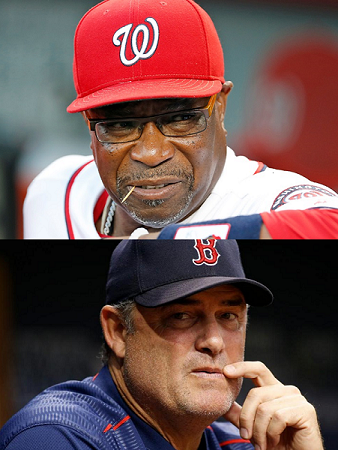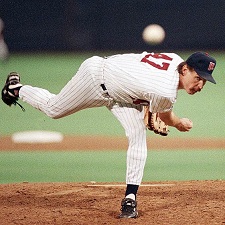MANAGERS ARE FIRED, CASHMAN LIVES ON
Sunday, October 29th, 2017Let’s see if we can get this straight. The Yankees don’t advance to the World Series so just like the Washington Nationals and the Boston Red Sox they fire their manager. They jettisoned Joe Girardi after 10 years and six post-season appearances.
In effect, although different words were used, Girardi leaves the Yankees in a manner similar to Joe Torre’s departure 10 years ago. General Manager Brian Cashman is the man left standing.
Cashman didn’t fire Torre after 12 years as manager, four World Series championships and six World Series appearances. He just made him an offer he could refuse, and Torre did. Cashman didn’t give Girardi an option. He just said, “You’re fired, Joe.”
No matter what you might have read or anyone might have said, the Girardi decision was Cashman’s.
According to a major league official, speaking on the condition of anonymity, the decision was left to Cashman, who after 20 years in his role, very likely figured he better do something to try to win again because if the Yankees continued to fail to win another World Series, his head might be the next one you hear hitting the street with a thud.
I rarely call for someone’s dismissal but in recent years I have advocated Cashman’s dismissal, for which I have acquired his everlasting enmity. If you looked closely enough this season, you might have seen some positive words in these columns about Cashman and the job he has done. Given his dismissal of Girardi, though, I retract anything positive I might have said about Cashman.
Not that I’m a big fan of Girardi’s, but I believe he’s a decent man who has done a decent job and has done nothing to deserve the axe. That, however, is what general managers do. They fire the manager for not winning before they themselves can be fired for not winning. Managers don’t have the luxury of firing general managers. Owners fire general managers, and the Yankees’ owner, Hal Steinbrenner, son of George, obviously won’t fire anyone as the result of watching his father fire one general manager after another, one manager after another, one pitching coach after another, one hitting coach after another.
When Hal Steinbrenner was a boy and was falling asleep at night, he didn’t count sheep; he counted the lopped off heads of Yankees’ general managers and managers. I mean, how many times can you see Billy Martin’s head falling from his neck before it has a lasting effect on an impressionable young mind?
In the Girardi matter, the decision to sign him to a new contract or get a new guy was left to Cashman, who wasn’t under any pressure. If Cashman fired Girardi and the Yankees didn’t win under his replacement, the decision would not come back to affect Cashman. He could act free of any fear for his own job.
That is the liberty Cashman has had for two decades. He isn’t even scrutinized by the news media. He is made of Teflon. Besides me, Cashman has only one critic, and he doesn’t count because he’s an anonymous critic who is obsessed with Cashman. But the guy is right with his view of Cashman. This was a post-firing e-mail the fellow wrote:
“Joe Girardi averaged a record of 91-71 over ten (10) seasons in New York, and did so with teams that did not have the talent to win 91 games for at least five (5) of those seasons and from 2013-2017. Good luck finding someone significantly better to replace him…”
This Cashman critic has never explained his negative view of the general manager; I just know that he’s a lot more incisive and perceptive than the reporters and columnists who cover the Yankees.
The Yankees, on the other hand, believe he is harassing Cashman, know who he is and have had him investigated. They have, however, been unable to stop his flood of e-mail.
Nor have they been able to stop spending multiple millions on their player payroll despite stated intentions to the contrary. Until the current Dodgers’ ownership took control in 2012, the Yankees routinely had the largest player payroll.
In Cashman’s two decades in charge of the payroll, the Yankees have spent $3.665 billion on player contracts. The Yankees won the World Series in Cashman’s first three years on the job, though the team had been put together before he took command, and they won again in 2009, which was Girardi’s second season as manager.
If Girardi hasn’t done a good enough job since to keep his job, has Cashman done a good enough job to keep his?
Given the free flow of funds, Cashman had had, I would say he has not done the job. The Yankees have not played on a level playing field with their division and league teams, but they haven’t won. I would attribute their failure to the way Cashman has constructed the team.
He is being credited with building the team this year with such young stars as Aaron Judge, Gary Sanchez and Luis Severino, but where were the good young players before them? The answer is simple. The Yankees didn’t have any good young players because Cashman kept Mark Newman in charge of the minor league system for 15 years, and he didn’t produce any good young players.
But now Cashman is an executive of the year for producing Judge, Sanchez and Severino. I don’t know if Cashman expected the Yankees to win the division and advance to the World Series with his good enough players, but he evidently expects that development next season. Only he didn’t think Girardi could do the job.
A baseball executive told me the Yankees left Girardi’s job status in Cashman’s hands, and Cashman recommended to Steinbrenner that a change was necessary. Blinded for some unknown reason by Cashman’s mind-numbing Svengali control, Steinbrenner replied, “Sure thing, Cash.” And Girardi was gone.
Steinbrenner’s problem is he hasn’t been in touch with his father about Cashman. Two decades on the job and nothing recent to show for it? No way that would have happened with George around. Apparently better to be lucky than good.
“Cashman,” the baseball executive said, “thinks to get the Yankees to the next level they had to make a change.”
I think, I remarked, the wrong guy was fired.
GIRARDI JOINS BAKER, FARRELL
Given that the Yankees have had only two managers in 22 years, the new man may find an awkward tilt to his job.
 Girardi was the third manager fired after his team reached the playoffs this year, suggesting it isn’t safe anymore just to make the playoffs. General Managers believe they are spending too much money just to make the post-season. It is now World Series or bust.
Girardi was the third manager fired after his team reached the playoffs this year, suggesting it isn’t safe anymore just to make the playoffs. General Managers believe they are spending too much money just to make the post-season. It is now World Series or bust.
Alex Cora, 42 years old, will replace John Farrell in Boston as soon as the World Series ends; Mickey Callaway, 42, has been recruited by the Mets to save their pitchers from themselves, and Dave Martinez, 53, is said to be getting Dusty Baker’s job in Washington.
Remaining to be filled are the jobs in Philadelphia, if the Phillies are still in the league, and the Yankees’ position.
No one has emerged publicly for the Phillies’ position. The newest name floated as the Girardi replacement is Jerry Hairston Jr. The 41-year-old Hairston has not coached or managed but has been a television analyst.
Hairston, a 16-year major leaguer, comes from a baseball-rich family. His brother, father and grandfather all played in the majors. He played in 45 games for the Word Series champion Yankees in 2009.
STARTERS FACE EARLY EXITS
If there has been a theme to the 2017 post-season, it has been “get the starting pitcher out of the game as quickly as possible.” It is the latest pitching development that is bizarre and makes no sense.
One starting pitcher, Jon Lester of the Cubs, has taken exception to the practice. Speaking last week on “Tiki and Tierney Show” on CBS Sports Radio and CBS Sports Network, said about pulling effective starters out of games early”:
“I hate it. I absolutely hate it. You pay your starting pitchers to be starting pitchers. You pay your studs to be studs. I remember growing up and watching these big-time guys – Roger Clemens, Greg Maddux, Smoltz. ‘Here’s the ball. You guys go get it. We’re going to live or die by you.’ Obviously if that falters early, you need to make a decision. That’s different. But if they are cruising, (leave them in).
You’re stretching your bullpen to get 15 outs. That’s a lot of outs from your bullpen. That’s a lot of mixing and matching. That’s a lot of high-stress pitches on those guys. Now you’re bringing in Kenley Jansen to get six outs, which I’m fine with. I don’t mind using your closer for six outs. But for me, you go back to the Yankee days where you had Roger Clemens, Andy Pettitte, these guys going (for seven or eight innings) and then you give the ball to Mo (Mariano Rivera). That’s the blueprint and that’s what you want every time.
But I just feel like when you ask your bullpen to get nine, 12, 15 outs, there’s a lot of things that can happen and you went from a 3-1 game to a 7-6 game. I feel like that’s what happens when you do that. It puts a lot of stress on your bullpen. They have the off day today. I get it on that side of it. But for me, it’s just not baseball. Baseball is your starters go six, seven, eight and then you mix and match and do your things that you need to do from that point forward. That’s my opinion on it.”
I could not agree more.


 “After the ninth,” the former Twins manager recalled, “I told Jack ‘That’s enough, Jack.’ Three times in 10 days I thought it was enough. He looked up at me. The pitching coach said ‘I think he’s OK.’ Jack said he was OK. After he has pitched the game of his life, how could I take it away from him? The 10th was probably the easiest inning he had. The 10th, not third or fourth.”
“After the ninth,” the former Twins manager recalled, “I told Jack ‘That’s enough, Jack.’ Three times in 10 days I thought it was enough. He looked up at me. The pitching coach said ‘I think he’s OK.’ Jack said he was OK. After he has pitched the game of his life, how could I take it away from him? The 10th was probably the easiest inning he had. The 10th, not third or fourth.”